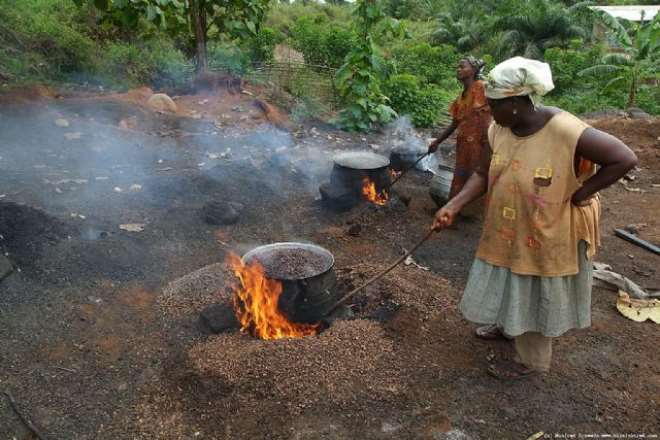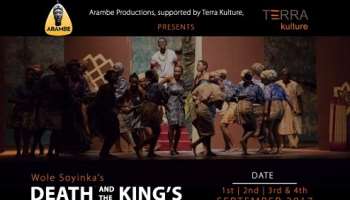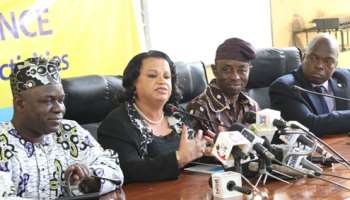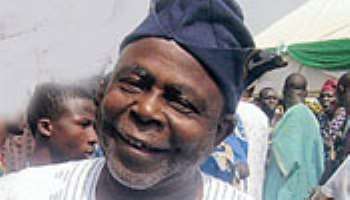Nollywood, may go the way of our palm oil, says Imoukhuede .
Frank Aig Imoukhuede is a renowned poet, playwright as well as an arts and culture critic. The author of such popular plays as Alante Tatakumi, a socio-political satire, Imoukhuede is often remember for his immense contributions to Nigeria while he was a culture administrator in the country's civil service where he rose to the position of Federal Director. In this interview with TONY OKUYEME, he bares his mind on development of the sector in the 50 years of Nigeria's independence, observing that so many thing have gone wrong.
He is no doubt an authority when issues about the culture sector in Nigeria take the centre stage. He bares his mind with great eloquence and characteristic passion. He is always at home with issues about culture. For him, the sector has not fared well and is in dire need of revival. He believes that culture plays a significant role in the re-branding campaign.
You are welcome to the world of Frank Aig Imoukhuede, Nigeria's Culture enthusiast extraordinaire.
He is very unhappy at the turn of events in the sector today. He says: “In general terms, if you look at culture, it is the totality of everything that moves us forward as a people, distinguishes us as a people, which we can hand down to our coming generation. I think that is what it means. And when we talk about re-branding and things like that, that is what we mean.”
Imoukhuede continues: “It is not a gimmick of pretending to be what you are not. Most of the things people say about us are true. So the way out of it is re-engineering, social re-engineering, cultural orientation and so on. And we must be positive.”
Since culture is dynamic, Imoukhuede believes that it is incumbent on the current generation shape the future as it desires. His words: “We cannot say because someone says we are thieves, therefore we say we are not thieves, yet we do nothing to people who are caught stealing. Right from the top to the bottom we have stories everyday in the papers of people stealing, people maneuvering out of the law.
“So when you when we come to that area we know that we are just more or less practising hypocrisy. We do not say that because someone says we are thieves, therefore we are not thieves because we said so. It is what you do that is your brand. So those are the areas one would look at.”
Would he say that there has been any remarkable improvement in the last 50 years since Nigeria's independence? the reporter asks. He giggles, and says with subtle emphasis and sarcasm: “The only thing that has improved is that there has been a lot of money out of culture; and that they have been using culture for social re-engineering to take the mind of the people away from the trauma they are going through. You can see that they talk all the time about Nollwood being a plus and so on, without knowing what really it is, and the problems that we have with Nollywood. They are not talking about that. But these are the things. Music, the same thing. We are almost self-sufficient in music, but we still have problems.”
He is not one in criticising the manner that the country is mishandling the sector. His words: “We could earn more than 1,000,000 times what we are earning in those areas now. The problem is that we do not recognise what to do with film. We do not even know what we are talking about. We are talking about moving pictures – movie, that is films which are made in celluloid, where the whole world engages all the time. And where the records are clear; and where when you say a box office hit, it is a box office hit. Not where you say this man is a star, and he rides on Okada. We do not really recognise what our problems are, and the very fact that we are going the way with Nollywood, for example, the way of our palm oil, where Malasia got the technology from us and now we are importing from Malaysia. Very soon, the way we are going, we will be dependent for the marketing and distribution of Nollywood in the real sense, on outside technology. We have a firm grip on how to tell stories and so on, but not in the way that is competitive in global terms. What we should do for film is to look at our area of strength, strengthen it; the areas of weakness, upgrade and raise our standards. We are not doing that.”
Imoukhuede believes that the country should be “producing what makes us number one in Africa and in the Africa diaspora. And we can develop satellite communication as well so that we can broadcast this distribution of our materials throughout the world and make money out of it. And at the same time continue to engage in film on celluloid on quota basis until we can rise up to catch up again, or until that one is phased out completely and we all rely on film on video”.
Anything to celebrate in the arts and culture sector in the last 50 years of Nigeria's independence? You asked further.
“Those are the things we can celebrate. At least, we are almost self-sufficient in music, although when you look at the quality, we have problems there. But, at least, we are self-sufficient. Our television stations and radio stations don't have to rely on outside materials. We can make a lot of forward movement. The only problem is that we have to learn how to combat our disabilities, that is question of piracy and so on.
When he talks about music being self-sufficient, is he referring to the fact that we can produce them in Nigeria? the reporter asks. His response: “We produce in Nigeria the industry, television. You watch the television, about 90% to 95% is local content. I mean that is something. The same thing with radio. But now all you need to do is upgrade your production and your technology. That is what you need in that area.”
Imoukhuede continues: “We have a lot of talents in Nigeria and we still rely on the old things. That is a big problem. The smugness that we have has stood in the way of forward movement in artistic direction and movement is a big handicap for the country. It is not that we don't have people writing anything, but when you look at the way we run our institutions, I will tell you, I handled the National theatre between 1981 and 1991. This was the period of our transitions, when I was moving from the National Council for Arts and Culture back into the ministry, and we did not have anybody in between, and so I was in charge administratively. A lot of the parastatals were - Copyright, NICO, National Gallery of Art and the so-called National Theatre and National Troupe - were under my department. But the decision of the consultative committee we'd been setting up and the panels that government had been establishing was that this things should be on their own and within those years, they were created. I was in the National theatre and I know exactly what the problem were in the theatre.”
He asserts that there is a trend which has to be discouraged. It is called 'Self-service'. “You are in charge of something and you use that to promote yourself, and propel yourself and your career forward, at the expense of other people. You resolve that as long as you are there, no new talents will be discovered and projected. And rather than do that you go back to the past and hang on to the people who were there before. You've seen that people still honour Chinua Achebe and other writers, but you have the new comers also getting their prizes and being recognised. That is what is lacking in most of the other areas which are under the control of civil servants.
What does he think is responsible for the delay in the implementation of even the new policy? His response: “The cultural policy has been implemented but badly. That is what you want to say. Some of the fine-tuning it deserves are not taking place. And, today, we have a body for example with two heads. Now, we have the National Theatre and the National Troupe. What we said in 1972 at the consultative committee meeting was that there should be a National Theatre with so many arms - music, drama, dance and so on, including children's theatre. But today what do we have? Have we ever had a music production? Has the National Theatre ever produced an Adam Fiberisima, or Sammy Akpabot or Mikky Nzewi? That is the problem, and they are there.
The National Theatre cannot produce anything that we said it should produce, and nothing has been done to change it, to fine-tune it to what it should be doing. Even with that new policy, I tell you, it does not contain a vision of the National Troupe and the National Theatre.
You saw the effect, when they were together. I am not saying that anyone has performed badly or well, but I tell you, for a long long time we haven't had a type of situation where a chief executive of a parastatal will stand up to the people on the board side, including the Minister, and say they are wrong. And that was what happened at the theatre, where someone was removed and he is now being brought back and up till now they are still waiting for Government to do something about what he said was wrong. The National Theatre has a State Box, I know about this one because we did a lot of things with that in my time when I was there, and now it doesn't exist. It has been destroyed by rain leaking from the top of the National theatre. And the leaking is part of the contract which was given five years ago, and nothing has happened. People have collected the money and are still asking for more and are still being paid more. There is something wrong somewhere.
The foremost culture administrator says that there is a way out. According to him, zero tolerance for corruption is the solution.
“The way out is this: the President said zero tolerance for corruption, let's take action. Let us have a clean, fresh beginning in the theatre. Two, let's have the different sections that we made in a theatre. If people are afraid that they would lose their job, well they are just mistaken because they we thinking in terms of two bodies. But now we are thinking of the National Orchestral, the National Theatre drama company, dance company and supporting areas, that is, corporate matters, engineering and technical matters, finance and administrative matters and so on. So nobody is going to lose any job if the whole thing is properly handled. What we need is a more effective reinforced National Theatre.
Is he calling for the return of the National Theatre and national troupe of Nigeria? He says: “It is not just about it re-merging, but about re-designing it and restructuring it. That way, you will have the symbiosis that is necessary between building and institution, which is lacking now. What is there is a body set up for finance to handle matters belonging to the National troupe; a body set up for finance to handle the National Theatre. That is repetition, whereas they can bring them all under one. This same administration, the same technical department, and so on.
Now, the major problem that we had is that Nigeria has been redesigned to have a capital elsewhere from where it was before. The plan for Abuja included a section that handled culture and arts. It is very close to what they have in Tokyo, where they have the section of the city that is designed for that. It is there in the master plan, and because that was the only body they knew at that time, it was called the National Theatre. Now is there a National Theatre in the federal capital, Abuja? There is nothing like that. There is a National Stadium in the capital, but not national theatre. What I found most disheartening, was that in one of the meetings where they were dismantling this idea, the Minister of Culture was there. I was the vice-chairman to the man who was dismantling it, the man in-charge of Abuja, the federal capital territory. I know about this because in 1984, we got a certificate of occupancy (C of O) for that land. It is much bigger than the National Theatre ground in Lagos. But it was converted to the national cultural complex in Abuja. In 1994, just before I left, Prof. Jeryy Gana took a memo to the Federal Executive Council on the issue, where it says that it should be developed for the several bodies responsible for culture, namely the National Institute for Cultural Orientation (NICO), the National Council for Arts and Culture (NCAC), the National Hall of Fame,which is another failed project, the National Theatre, the National Gallery of Art, and the Centre for Black and African Arts and Civilisation (CBAAC). A Certificate of Occupancy was obtained, then there were problems within. There was quarrel among the chief executives, each one looking for territory where he would control the finance for capital projects. Now there is a strange development; part of the land approved for the building the culture complex in Abuja is where the SilverBird Galleria is now. I have not seen that issue in any of the problems they raised against the past Minister of the Federal Capital Territory (FCT) who is facing charges in the court. Part of the land meant for the national culture complex has been used for Silver bird Galleria. NCAC has been kicked out of the land; and nobody even cried out.
Now, when you come into what we have failed in, if you look at the cultural policy, there is a provision for the National Hall of Fame. There is a provision for it in the budget. Where does the money go to? I know that in 1991 or so, the body that was supposed to be running it was asked to pass it over to NCAC. So what happened to the National Hall of Fame? It is not the hall of fame that other people are doing, but the national Hall of Fame.
That is why when we look around and see that a change of baton is due in the parastatals, they are being returned, one begins to wonder why? What is their achievement? What is their record? What is the type of performance of those people?”
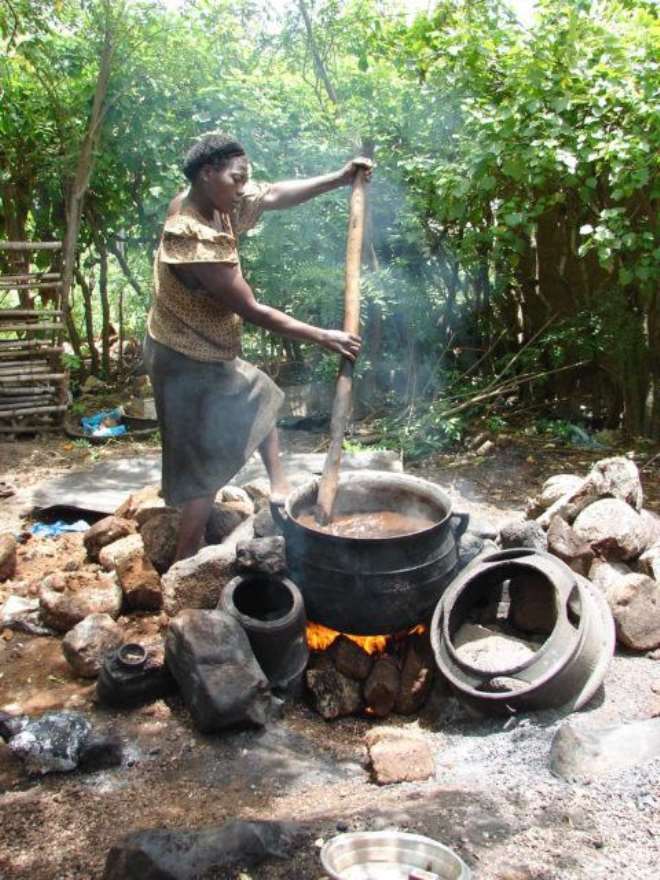
Latest News
-
 "If You're For Me, I Am For You" - Cubana Chief P
"If You're For Me, I Am For You" - Cubana Chief P -
 "3 Days To Go" - Femi Adebayo Urges Fans To Get S
"3 Days To Go" - Femi Adebayo Urges Fans To Get S -
 "Stop Asking Me Questions About Speed Darlington"
"Stop Asking Me Questions About Speed Darlington" -
 "Benue Is The Most Underdeveloped State I've Ever
"Benue Is The Most Underdeveloped State I've Ever -
 Stan Alieke Urges Young Professionals To Take Lin
Stan Alieke Urges Young Professionals To Take Lin -
 Chizzy Alichi Teases Fans With Baby Reveal, Promot
Chizzy Alichi Teases Fans With Baby Reveal, Promot -
 "I'm Not Wearing Makeup From July 4th Till Decemb
"I'm Not Wearing Makeup From July 4th Till Decemb -
 "Stop The Challenge Of Mocking Kids With Down Syn
"Stop The Challenge Of Mocking Kids With Down Syn -
 Regina Daniels Celebrates Sons As They Mark Birthd
Regina Daniels Celebrates Sons As They Mark Birthd -
 Speed Darlington Threatens To Sue NAPTIP For Defam
Speed Darlington Threatens To Sue NAPTIP For Defam


